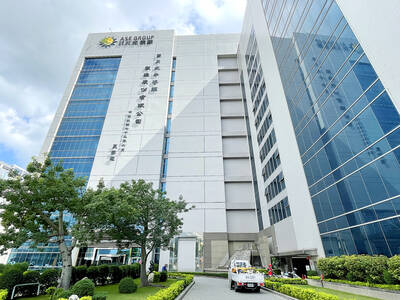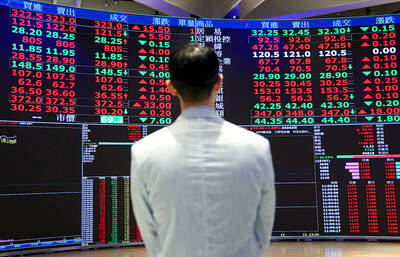Japan’s finance minister said he would like to see price growth of 1 percent and urged the Bank of Japan (BOJ) to cooperate in beating deflation, putting fresh pressure on the central bank for more action to support a fragile economy.
BOJ Governor Masaaki Shirakawa said the central bank was willing to cooperate, but he offered few clues on what it would do beyond keeping monetary conditions very easy.
“I personally would like to see [consumer price index, or CPI] growth of around 1 percent, or perhaps even a little more,” Naoto Kan told a lower house budget committee yesterday.
“I think the BOJ shares the government’s view that this is a desirable policy goal,” he said, adding that how best to achieve the goal was up to the central bank to decide.
INTEREST RATE
The BOJ is likely to keep interest rates at 0.1 percent and hold off on any new initiatives at a rate review ending yesterday, as it expects Japan to avoid another recession despite a likely slowdown early this year.
The bank does, however, appear to be ready to ease policy again in the future if market shocks, such as a sharp rise in the yen or a heavy tumble in Tokyo shares, threaten a fragile economic recovery.
Shirakawa, addressing the same budget committee as Kan, repeated that the BOJ would keep monetary conditions very easy and was always ready to provide liquidity when necessary.
“We are serious about ending deflation. It will take time and it’s not something the BOJ alone can achieve. But we will be doing all we can,” he said.
However, he effectively ruled out any return to quantitative easing, a policy under which the BOJ flooded markets with excess cash from 2001 to 2006 in a bid to end an earlier bout of deflation.
Quantitative easing was effective in ensuring financial stability, but it had only a limited effect in pushing up prices, Shirakawa said.
Japan’s economy grew faster than expected in the fourth quarter owing to a stimulus-fueled rebound in domestic demand and corporate investment. However, markets focused on the record 3 percent annual fall in the GDP deflator as a sign that the gap between supply and demand was pushing Japan deeper into deflation.
“[Deflation] is unlikely to result in immediate easing, but it will keep up the pressure on the Bank of Japan to continue with an easy monetary policy,” said Takafumi Yamawaki, a senior rates strategist at BNP Paribas Securities.
CORE CPI
Japan’s core CPI fell from a year earlier for the 10th straight month in December and the so-called “core-core” CPI, the narrowest measure of consumer inflation, fell at the fastest pace on record.
Haruhiko Kuroda, the head of the Asian Development Bank, also urged the BOJ to work out a solution for persistent price falls, telling a newspaper interview that Japan was virtually alone in suffering deflation.

EXPANSION: The investment came as ASE in July told investors it would accelerate capacity growth to mitigate supply issues, and would boost spending by 16 percent ASE Technology Holding Co (ASE, 日月光投控), the world’s biggest chip assembly and testing service provider, yesterday said it is investing NT$17.6 billion (US$578.6 million) to build a new advanced chip packaging facility in Kaohsiung to cope with fast-growing demand from artificial intelligence (AI), high-performance-computing (HPC) and automotive applications. The new fab, called K18B, is to commence operation in the first quarter of 2028, offering chip-on-wafer-on-substrate (CoWoS) chip packaging and final testing services, ASE said in a statement. The fab is to create 2,000 new jobs upon its completion, ASE said. A wide spectrum of system-level chip packaging technologies would be available at

Taiwan’s foreign exchange reserves hit a record high at the end of last month, surpassing the US$600 billion mark for the first time, the central bank said yesterday. Last month, the country’s foreign exchange reserves rose US$5.51 billion from a month earlier to reach US$602.94 billion due to an increase in returns from the central bank’s portfolio management, the movement of other foreign currencies in the portfolio against the US dollar and the bank’s efforts to smooth the volatility of the New Taiwan dollar. Department of Foreign Exchange Director-General Eugene Tsai (蔡炯民)said a rate cut cycle launched by the US Federal Reserve

HEAVYWEIGHT: The TAIEX ended up 382.67 points, with about 280 of those points contributed by TSMC shares alone, which rose 2.56 percent to close at NT$1,400 Shares in Taiwan broke records at the end of yesterday’s session after contract chipmaker Taiwan Semiconductor Manufacturing Co (TSMC, 台積電) hit a fresh closing-high amid enthusiasm toward artificial intelligence (AI) development, dealers said. The TAIEX ended up 382.67 points, or 1.45 percent, at the day’s high of 26,761.06. Turnover totaled NT$463.09 billion (US$15.22 billion). “The local main board has repeatedly hit new closing highs in the past few sessions as investors continued to embrace high hopes about AI applications, taking cues from a strong showing in shares of US-based AI chip designer Nvidia Corp,” Hua Nan Securities Co (華南永昌證券) analyst Kevin Su

Nvidia Corp’s major server production partner Hon Hai Precision Industry Co (鴻海精密) reported 10.99 percent year-on-year growth in quarterly sales, signaling healthy demand for artificial intelligence (AI) infrastructure. Revenue totaled NT$2.06 trillion (US$67.72 billion) in the last quarter, in line with analysts’ projections, a company statement said. On a quarterly basis, revenue was up 14.47 percent. Hon Hai’s businesses cover four primary product segments: cloud and networking, smart consumer electronics, computing, and components and other products. Last quarter, “cloud and networking products delivered strong growth, components and other products demonstrated significant growth, while smart consumer electronics and computing products slightly declined,” compared with the